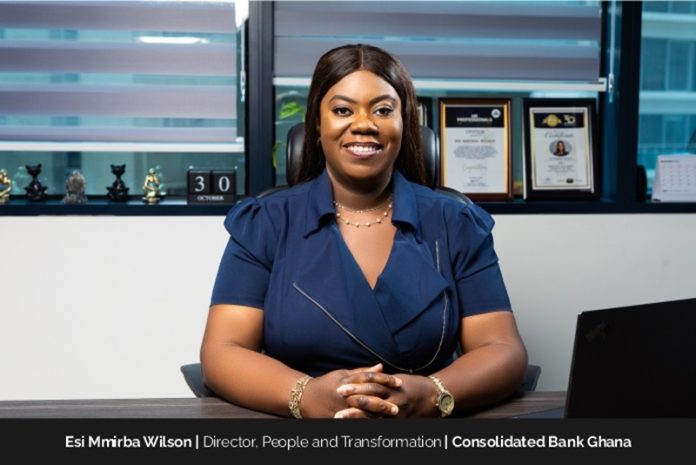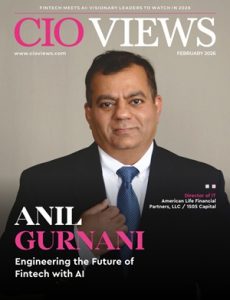Much like a sculptor chisels away at a block of stone, Esi Mmirba Wilson, Director of People and Transformation at Consolidated Bank Ghana (CBG), has carved out a distinguished career from the most unlikely of beginnings. Surprisingly, she didn’t start in HR. Her professional journey began in graphic design, where creativity flowed through every project. Yet, as any true artist knows, the canvas sometimes demands more than just brushstrokes. For Esi, it called for a deeper connection with people—a calling that would redefine her career and position her as one of Africa’s leading HR professionals.
Human Resources is a sector that ideally requires and demands individuals with a unique blend of empathy and people management skills. Sadly, in recent years, the industry often lacks such talent, especially in leadership roles. However, Esi stood out with her innate gifts. Her transition from graphic design to HR was propelled by her natural ability to connect with others—a quality that quickly caught the attention of her colleagues and mentors.
It didn’t take her much time to understand her inner calling, and she recognized her passion for people and organizational development, so she diligently embraced this new path. But Esi’s journey was far from conventional. Transitioning industries required her to master new skills rapidly while proving her value in an unfamiliar field.
This drive to incessantly learn and adapt set her apart. It nudged her to explore her best of abilities. These qualities and ethos position her as a trailblazer in this sector. Eventually, she could bring a wave of changes. Her leadership style, denoted by a unique combination of creativity and empathy, reflects her diverse background and commitment to innovation.
Under her guidance, CBG has undergone a remarkable transformation. Esi has combined innovative HR strategies with empathy with ease, helming the complexities of a historic merger. Her approach prioritizes business outcomes but also the well-being of employees. It has helped in promoting a supportive environment where talent thrives. As a CIPD Associate and Prosci Certified Change Practitioner, she continues to drive cultural change and champion employee development within Ghana’s financial sector.
In this exclusive interview, Esi reflects on her unique journey, discusses strategies for overcoming organizational challenges, and shares her vision for the future of HR at CBG. Calling herself still an artist and passionate about everything arty, she infuses these nuances in HR which is also an art of managing people with tender care and attention to detail. Read on to learn what it is meant by leading with heart and how Esi Mmirba Wilson has transformed CBG’s People and Culture.
Excerpts from the Q&A session:
Q: Can you tell us about your journey into HR? How did it all begin?
Esi: I didn’t start my career with plans of becoming a Human Resource Professional. I began my career as a Graphic Designer, and I am still a graphic designer at heart, designing all my presentations. I love all forms of art, and this career choice was due to my early experiences working with my uncle in his Graphic Design firm as a receptionist. As I observed the creative work and discussions with clients, I opted to study Publishing Studies at the Kwame Nkrumah University of Science and Technology. After university, I joined a Graphic Design Company as a Copywriter and moved on after a few months to work in a printing house, initially as the Assistant Production Controller and later as the Quality Assurance Manager at a young age. Frankly, I began managing people before the age of 30, and one of the HR Directors I worked with would often comment on my ability to connect with different age groups, from younger colleagues to retirees. She believed I had a natural ability in people management, which piqued my interest in HR. After realizing that the printing industry in Ghana had limited opportunities, I pursued an MBA in HR at the University of Ghana Business School. After I landed my first Head of HR role, I discovered my true passion was People.
Q: How did you find yourself at Consolidated Bank Ghana Ltd (CBG)?
Esi: The creation of CBG happened through a purchase and assumption of five defunct banks by the Government of Ghana through the Bank of Ghana in 2018. At the time, I was working with Sovereign Bank, one of the institutions involved in the merger. Later, two defunct banks were added to the purchase and assumption. From the start, CBG had acquired seven HR leaders from different banks, so I wasn’t the only HR leader. However, through perseverance, hard work, and delivery of results, I was appointed as the General Manager for Human Capital in 2019 and became the Director of People and Transformation in 2020.
Q: Managing such a large merger must have come with significant challenges. What were the major obstacles you faced?
Esi: One of the biggest challenges was the need to reduce staff authentically. After our analysis, we realized that while we needed about 2,300 employees to run the 118 branches and other departments, the new entity had 4,500 people. Reducing the workforce was a tough exercise for all of us. We tried to soften the experience by categorizing the various employment contracts. Based on this, we were able to determine the right course of action. We worked with a company that opted to provide some with entrepreneurial training and got support from UNICOF (Union of Industry, Commercial, and Finance Workers) in collaboration with the Receiver and Ministry of Labour to give all employees of the defunct banks a soft landing.
Another challenge was managing the integration of multiple banking systems. Initially, we had to operate different banking systems from the merged banks, and this was understandably frustrating for our staff. To manage this, the technology team introduced creative solutions, while the HR team also introduced performance management strategies. A critical milestone was the town hall meetings we held to keep employees informed about the transition processes and address any concerns.
Q: You’ve led a significant cultural transformation at CBG. How did you approach this, and what makes it your greatest achievement?
Esi: When CBG was formed, the staff were understandably disconnected and uncertain about their futures. Some people had lost colleagues, and others didn’t know what the new organization meant for them. To address this, my team and I used the PROSCI change management principles. To create awareness for change, we visited the nine regions to interact directly with the various teams, supporting them to understand the direction of CBG and the opportunities ahead. I also introduced initiatives and training programs to reinforce and unite the various identities from the merged banks into one cohesive CBG culture.
One unique change was making Mondays our local attire day instead of Fridays, which set us apart and reinforced that CBG was building something different. Today, no one talks about being from the original banks – everyone identifies as CBG. Although there is still some resistance, as compared to 2018, the inroads we’ve made with our cultural transformation is one of my greatest achievements.
Q: In your role, you’ve also had to build and strengthen your HR team. What was your strategy?
Esi: Recognizing that some team members in the People and Transformation Division were there not out of passion but by circumstance, I set out to inspire and challenge them to see their roles with renewed purpose. By introducing challenging assignments and encouraging regular presentations to build their confidence and skills, I built a team capable of addressing anyone in leadership, even the Managing Director, with well-thought-out solutions. Today, the feedback I receive from internal and industry colleagues is that my team’s submissions and proposals are top-notch at the executive level and that they act professionally. That, for me, is the ultimate measure of success – knowing that you have made an impact in the lives of the next generation of leaders.
Q: What does a regular day at work look like for you?
Esi: My day revolves around people. I start by reviewing documents and ensuring approvals go through. After meeting with the MD and CFO to understand the bank’s financial health, I spend a significant amount of time engaging with our employees, either at the head office or at the branches, either via phone or in person. I believe human contact is crucial in building relationships and driving cultural transformation. I also dedicate time to research, looking at how global organizations are supporting their staff to bring in new ideas for CBG. I should add that I try to strike a balance between my personal and professional life by maintaining clear boundaries. When I’m at the office, my focus is solely on work, and when I’m at home, I give my full attention to my personal life. I’m fortunate to have a very supportive family, especially my husband, who plays a key role in helping me maintain this balance.
Q: Looking ahead, what’s your focus for the company, especially with the upcoming presidential elections?
Esi: The election is on our minds, particularly as a government-owned bank. I’ve discussed with my team the importance of understanding both main political parties’ plans for the financial sector so we can prepare in advance. We don’t want to wait until the elections are over to scramble. We will continue to engage various staff and have open conversations with them. These conversations will seek to ease their concerns. Ultimately, it’s the people you worry about the most.
It is critical for us to be forward-thinking. Our strategy remains strong, but we’re also looking at adjustments to ensure our people are prepared for the future.
Q: What message do you have for aspiring leaders?
Esi: I believe in servant leadership. As a leader, you need to work alongside your people, not just give instructions. Listening to your team is key – they often have the solutions. And it’s important to communicate a clear vision, so it becomes a shared goal for everyone. Lastly, results matter. Being a laissez-faire leader won’t move people or organizations forward.
Q: What’s next for you? Do you have any personal aspirations?
Esi: I am proud of my achievements at CBG and look forward to achieving my Managing Director’s vision of creating a Learning Organization. I’m still on my life’s journey to achieve even more. On a personal level, I’m considering starting my own company at some point. It is a new challenge that I look forward to.
Esi’s journey epitomizes indomitability, foresight, and the catalytic force of servant leadership. Through her unwavering commitment to cultural amalgamation, professional ascendance, and avant-garde strategies, she has revolutionized HR paradigms at CBG and inspired countless souls.
As she traverses the future, the veteran HR leader remains an idol of innovation and inclusivity, ceaselessly endeavoring to forge an enduring impact where individuals and organizations flourish in unison. Her story serves as a potent reminder that authentic leadership is rooted in empathy, audacity, and an unwavering dedication to empowering others.
Visit full Magazine: Africa’s 10 Most Influential Women Leaders to Watch in 2024





